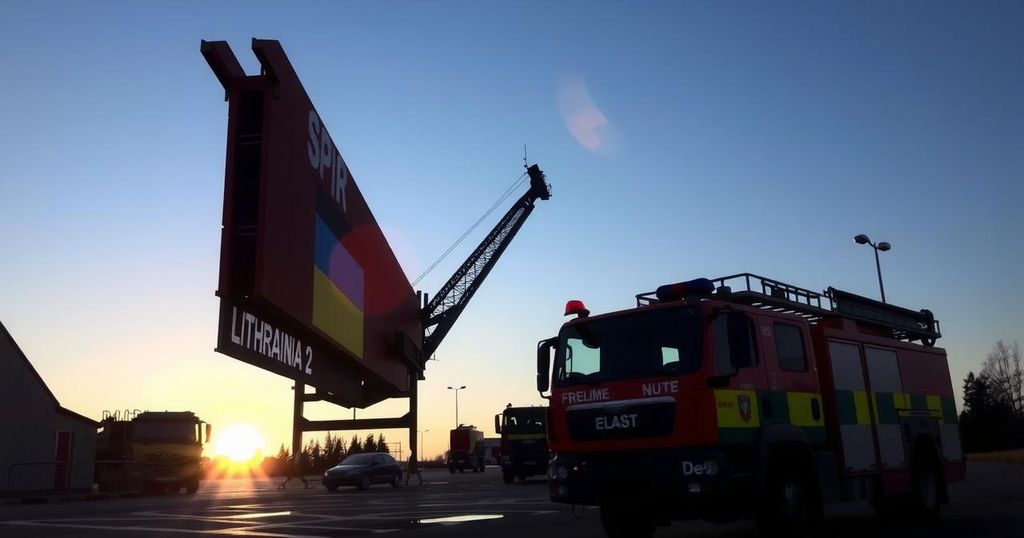Lithuania’s Donation of Fire Engines to Ukraine Sparks Outrage from Zimbabwe

Lithuania’s donation of 17 fire engines to Ukraine, originally belonging to Zimbabwe, has prompted outrage from political analysts who label the move as unlawful and discriminatory. The fire engines were confiscated during transit to Zimbabwe, sparking demands for their return and raising concerns over international law and the effects of Western sanctions on Zimbabwe’s emergency services.
In a controversial decision, Lithuania has chosen to redirect 17 fire engines, originally meant for Zimbabwe, to Ukraine. This move has elicited significant backlash, as political analysts perceive it as an unlawful act and discriminatory towards Zimbabwe. The fire engines, acquired by Zimbabwe from Belarus, were confiscated by Lithuanian authorities during their transportation to Harare, prompting outrage from the Zimbabwean government, which demands their return. Advocate Obert Gutu, a prominent political analyst, condemned this act as “shameful, scandalous, and unlawful,” arguing that the fire engines are the legitimate property of Zimbabwe, a sovereign state. Gutu emphasized that Lithuania lacks legal authority under both public and private international law to seize the fire engines and transfer them to Ukraine or any other nation without Zimbabwe’s consent. He characterized Zimbabwe as an unwitting participant in the geopolitical tensions between Lithuania and Belarus, suggesting a possible underlying element of racism in Lithuania’s decision. “If Zimbabwe were a European country, I doubt such a decision would have been made,” he remarked. Similarly, political analyst Mr. Tongai Dana criticized the repercussions of Western sanctions that led to the confiscation of the fire engines. He highlighted the significance of these vehicles for emergency services, noting their absence undermines Zimbabwe’s disaster response capabilities. “The confiscation of these fire engines is a stark example of how Western sanctions negatively impact ordinary people. While these measures are meant to pressure governments, it is the vulnerable citizens who suffer most,” Mr. Dana stated. He called for the lifting of sanctions on Zimbabwe, emphasizing that the citizens deserve safety and protection equivalent to that of any other nation. Additionally, Mr. Shadreck Mashayamombe described Lithuania’s actions as “callous,” pointing out that fire engines serve the vital function of providing emergency services. He noted that their confiscation illustrates the indiscriminate nature of sanctions. “Our rights are being violated,” he asserted, urging for a diplomatic resolution to the matter rather than repurposing Zimbabwe’s assets for another country. The Zimbabwean government continues to press Lithuania for the retrieval of the fire engines, as diplomatic negotiations surrounding this contentious issue progress.
The donation of fire engines by Lithuania to Ukraine, which were initially purchased by Zimbabwe, has brought to light the complex intersections of international law, national sovereignty, and geopolitical conflicts. This incident arises amidst heightened tensions between various nations, particularly involving Ukraine and Russia, and illustrates the unintended collateral damage of international sanctions imposed by Western powers. The confiscation of property belonging to Zimbabwe has ignited political discourse regarding the rights of sovereign nations and the implications of such actions on global diplomatic relations.
The donation of fire engines from Lithuania to Ukraine, originally meant for Zimbabwe, highlights a serious diplomatic conflict and the legal implications of confiscating foreign property. Analysts have fervently argued against Lithuania’s actions, declaring them unlawful and indicative of a deeper geopolitical conflict. As the situation unfolds, it remains crucial to consider both the rights of sovereign nations and the impact of international sanctions on vulnerable populations.
Original Source: bulawayo24.com








